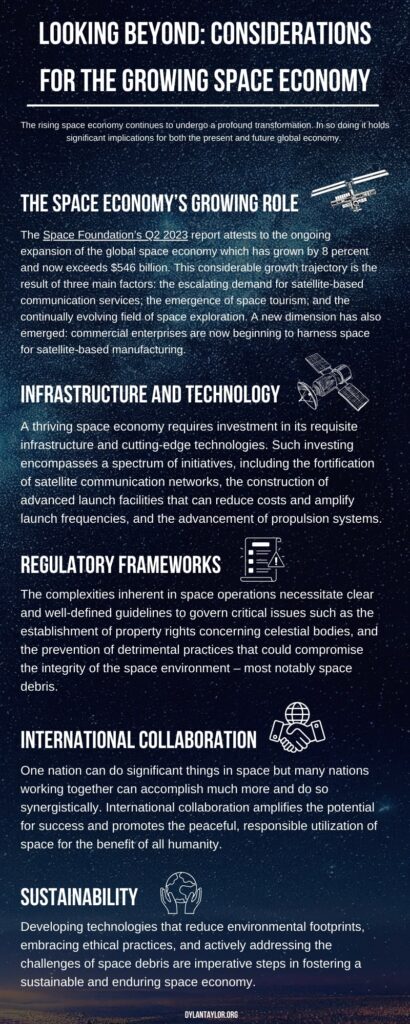The rising space economy continues to undergo a profound transformation. In so doing it holds significant implications for both the present and future global economy. The notion of a space economy, previously seen as rather futuristic, now encompasses satellite communication, space science, and actual commercial ventures. Space has become a driving force behind technological advancement and economic progress. Looking ahead, it is increasingly important for nations and industries to prepare a resilient, sustainable foundation upon which to nurture the burgeoning space economy.
The Space Economy’s Growing Role
The Space Foundation’s Q2 2023 report attests to the ongoing expansion of the global space economy which has grown by 8 percent and now exceeds $546 billion. This considerable growth trajectory is the result of three main factors: the escalating demand for satellite-based communication services; the emergence of space tourism; and the continually evolving field of space exploration. A new dimension has also emerged: commercial enterprises are now beginning to harness space for satellite-based manufacturing. Together, these developments signal a pivotal shift from space’s historical association primarily with governmental agencies toward a dynamic and flourishing ecosystem of public and private enterprises.
Infrastructure and Technology
A thriving space economy requires investment in its requisite infrastructure and cutting-edge technologies. Such investing encompasses a spectrum of initiatives, including the fortification of satellite communication networks, the construction of advanced launch facilities that can reduce costs and amplify launch frequencies, and the advancement of propulsion systems.
Regulatory Frameworks
As commercial activities in space gather momentum, there is a pressing need to adapt regulatory frameworks. The complexities inherent in space operations necessitate clear and well-defined guidelines to govern critical issues such as the establishment of property rights concerning celestial bodies, and the prevention of detrimental practices that could compromise the integrity of the space environment – most notably space debris. An effective regulatory framework serves not only to ensure responsible conduct – but also serves to foster an environment of trust and cooperation among various stakeholders.
International Collaboration
The very nature of the space economy is inherently global in scope. One nation can do significant things in space but many nations working together can accomplish much more and do so synergistically. This globalistic nature underscores the significance of cross-border collaboration, pooling resources, sharing risks, and leveraging collective expertise. International collaboration amplifies the potential for success and promotes the peaceful, responsible utilization of space for the benefit of all humanity.
Sustainability
As the space economy matures and expands, so too does the responsibility to conduct activities sustainably. There is a widening spotlight on environmental sustainability transcending industry, and the space sector is not exempt. Developing technologies that reduce environmental footprints, embracing ethical practices, and actively addressing the challenges of space debris are imperative steps in fostering a sustainable and enduring space economy.
The space economy’s ongoing growth is a testament to its inevitable place in our economic future. By prioritizing investments in infrastructure, technology, and broad regulation, stakeholders can bolster this trajectory for generations to come. We’re all aware of the pitfalls that have resulted from centuries of Earth’s terrestrial based economy. Space now offers us a chance to both work on a clean slate, cognizant of prior mistakes, but also to fix some of those mistakes using the unique vantage point and resources that space offers.







